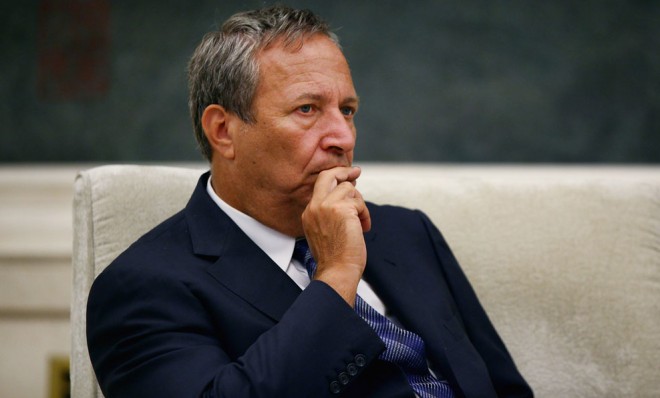Why Larry Summers threw in the towel


A free daily email with the biggest news stories of the day – and the best features from TheWeek.com
You are now subscribed
Your newsletter sign-up was successful
It's too early to say for sure why Larry Summers decided to take himself off President Obama's list of possible contenders for Fed chair. He seems to have cut some sort of implicit deal with Obama years ago: He'd take a position that was beneath him, and when Ben Bernanke's term was up, Summers would easily be nominated. And not without warrant: Summers has all the right credentials.
It turns out that history has saddled with him several of the wrong credentials, too. Over time, and not too fairly, he's been blamed by a lot of powerful people for tilting Obama recovery plan toward the financial sector, and for fighting other appointments of more liberally inclined economists to other administration posts. But Obama had his back. (The recovery was always Obama's, and the books we've consumed so far suggest that Obama usually understood exactly the implications of some of the very complex technical decisions that his economists had to make.)
The proximate cause of his withdrawal is that the Senate confirmation hearing he would face would be turned into a review of the past, rather than focus on his ideas for the present. It would be "acrimonious," Summers acknowledged, which is putting it lightly. Quite simply, he'd face fire from both Democrats and Republicans, and at a time when the Obama administration is still struggling to convince businesses and consumers that the economy is recovering, all that heat would counter that message. I think such a review of past policy would be interesting and productive, but the White House obviously doesn't share my views.
The Week
Escape your echo chamber. Get the facts behind the news, plus analysis from multiple perspectives.

Sign up for The Week's Free Newsletters
From our morning news briefing to a weekly Good News Newsletter, get the best of The Week delivered directly to your inbox.
From our morning news briefing to a weekly Good News Newsletter, get the best of The Week delivered directly to your inbox.
As POLITICO noted, a number of Democratic senators are circling on the anti-Summers bandwagon and have elections in 2014. The presence of an absolutely qualified and more politically palatable alternative, Janet Yellen, made their decision easier. Yellen will face fire from Republicans, and partisan fire, which Democratic senators will relish and gain momentum from. Our politics has taken a distinctively populist turn, even if only in tone, and Yellen better fits the moment. It is extraordinary that liberal pressure groups have exerted influence on the Fed chair process, but indeed they have. And perhaps it's a good thing: Not since Paul Volcker has the position been at the center of the debate about the way forward.
Summers is really smart. He understands this. He thinks it's bullshit. But he's not going to stand in the way of history.
A free daily email with the biggest news stories of the day – and the best features from TheWeek.com
Marc Ambinder is TheWeek.com's editor-at-large. He is the author, with D.B. Grady, of The Command and Deep State: Inside the Government Secrecy Industry. Marc is also a contributing editor for The Atlantic and GQ. Formerly, he served as White House correspondent for National Journal, chief political consultant for CBS News, and politics editor at The Atlantic. Marc is a 2001 graduate of Harvard. He is married to Michael Park, a corporate strategy consultant, and lives in Los Angeles.
-
 Quiz of The Week: 7 – 13 February
Quiz of The Week: 7 – 13 FebruaryQuiz Have you been paying attention to The Week’s news?
-
 Nordic combined: the Winter Olympics sport that bars women
Nordic combined: the Winter Olympics sport that bars womenIn The Spotlight Female athletes excluded from participation in demanding double-discipline events at Milano-Cortina
-
 Samurai: a ‘blockbuster’ display of Japanese heritage
Samurai: a ‘blockbuster’ display of Japanese heritageThe Week Recommends British Museum show offers a ‘scintillating journey’ through ‘a world of gore, power and artistic beauty’
-
 The pros and cons of noncompete agreements
The pros and cons of noncompete agreementsThe Explainer The FTC wants to ban companies from binding their employees with noncompete agreements. Who would this benefit, and who would it hurt?
-
 What experts are saying about the economy's surprise contraction
What experts are saying about the economy's surprise contractionThe Explainer The sharpest opinions on the debate from around the web
-
 The death of cities was greatly exaggerated
The death of cities was greatly exaggeratedThe Explainer Why the pandemic predictions about urban flight were wrong
-
 The housing crisis is here
The housing crisis is hereThe Explainer As the pandemic takes its toll, renters face eviction even as buyers are bidding higher
-
 How to be an ally to marginalized coworkers
How to be an ally to marginalized coworkersThe Explainer Show up for your colleagues by showing that you see them and their struggles
-
 What the stock market knows
What the stock market knowsThe Explainer Publicly traded companies are going to wallop small businesses
-
 Can the government save small businesses?
Can the government save small businesses?The Explainer Many are fighting for a fair share of the coronavirus rescue package
-
 How the oil crash could turn into a much bigger economic shock
How the oil crash could turn into a much bigger economic shockThe Explainer This could be a huge problem for the entire economy
